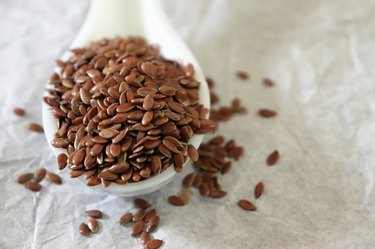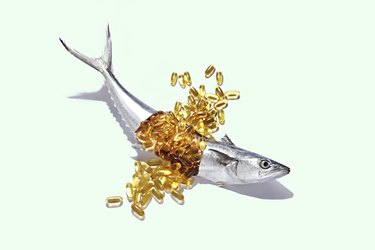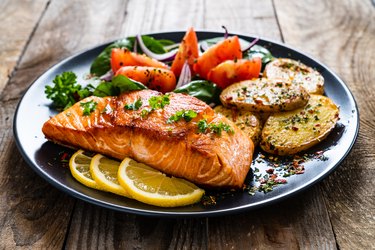
A diet high in fat gets a reputation for contributing to health problems, but it all depends on the kind of fat you're eating.
Highly processed foods that contain trans fats and saturated fats (i.e. fried foods, commercial baked goods, fast food, etc.) should be limited, according to the American Heart Association (AHA). But there is dietary fat that's beneficial for our bodies. In fact, it's fat that cardiologists want you to eat more of for longevity and heart health: omega-3 fatty acids.
Video of the Day
Video of the Day
Omega-3s play an important role in supporting heart health and other functions of your body, per the Cleveland Clinic. They can be found in several foods — and not just fish — like walnuts, edamame and chia seeds. And if you aren't getting enough of them from the food you eat, omega-3s also come in supplement form as fish oil.
"Your body cannot make omega-3s on its own. That's why they have to be included in your diet with either food or a supplement," explains Geetha Naik, MD, a recently retired New-York based cardiologist.
The AHA recommends eating at least two servings of fish rich in omega-3s each week. "I recommend salmon, trout, tuna or sardines. Oily fish contain the most omega-3s," Dr. Naik says.
Here, cardiologists explain the benefits of including omega-3s in your diet to keep your heart healthy.
1. Omega-3s Are Associated With a Lower Risk of Heart Disease and Stroke
Cardiologists like omega-3s for many reasons, one of them being their ties to lower rates of heart disease and stroke.
Researchers followed more than 3,000 people with heart disease or diabetes for 5 years in a November 2019 trial in Circulation. Half were given a placebo and half were given icosapent ethyl, a heart medication derived from omega-3 fatty acids. Those given the treatment had a lower chance of having a heart attack, a stroke or dying from any cause compared to those given the placebo.
2. They're Linked to Lower Blood Pressure
Research suggests omega-3s may help reduce blood pressure, but the amount of omega-3s needed to do so is still unclear. A June 2022 review in the Journal of the American Heart Association estimated between 2 and 3 grams of omega-3 fatty acids a day may be ideal, but found more may be associated with additional benefits for people at higher risk of heart concerns.
"Blood pressure can be reduced modestly from consuming about 3 grams a day of omega-3 fatty acids," Dr. Naik tells LIVESTRONG.com. That's about the amount in 4 to 5 ounces of Atlantic salmon, according to the Office of Dietary Supplements.
"But there are other lifestyle factors that should be considered if you're trying to lower your blood pressure," she adds, "like regular exercise, limiting sodium and reducing stress."
3. Omega-3s Are Tied to Less Plaque Buildup
Clogged arteries can cause serious, and sometimes fatal, outcomes from heart attacks and strokes. This happens when plaque builds up on the inner walls of the arteries and can reduce blood flow, block it entirely or rupture, potentially causing a heart attack, according to Jorge Escobar, MD, a cardiologist with the Texas Heart Institute.
Plaque is made up mostly of cholesterol, fat and calcium. "Omega-3 fatty acids slow down the growth rate of cholesterol plaque buildup in the arteries of the heart," Dr. Escobar says.
In a small August 2020 study in the European Heart Journal of icosapent ethyl, the fish oil-derived heart medication, people with plaque buildup had less plaque after 18 months of treatment compared to those given a placebo.
4. They're Linked to a Lower Risk of Irregular Heartbeat
People with higher levels of omega-3s are less likely to develop an irregular heartbeat.
"Irregular heartbeats, also known as atrial fibrillation or 'AFib,' is more common in older adults, but can affect anyone," Dr. Escobar explains. "It increases the risk of serious medical events like stroke, heart failure and other complications."
In a January 2012 study in Circulation, researchers followed more than 3,000 adults over age 65 for 14 years. Those with the highest levels of omega-3s in their blood had a 29 percent lower risk of atrial fibrillation, compared to the people with the lowest levels of omega-3s.
Tasty Ways to Eat More Omega-3s
Adding more omega-3s to your diet can be a delicious endeavor. Dr. Escobar recommends having fatty fish at least twice a week, or eating different non-seafood options such as tofu and other forms of soybeans, walnuts and flaxseeds.
Here are some tasty recipes to help you enjoy more omega-3s on the regular:
- Cleveland Clinic: "Omega-3 Fatty Acids"
- Journal of Atherosclerosis and Thrombosis: "Prevention of Cardiovascular Events with Omega-3 Polyunsaturated Fatty Acids and the Mechanism Involved"
- American Heart Association: "Consuming About 3 Grams of Omega-3 Fatty Acids a Day May Lower Blood Pressure"
- Journal of the American Heart Association: "Omega‐3 Polyunsaturated Fatty Acids Intake and Blood Pressure: A Dose‐Response Meta‐Analysis of Randomized Controlled Trials"
- Cleveland Clinic: "Icosapent Ethyl Capsules"
- Circulation: "Association of Plasma Phospholipid Long-Chain Omega-3 Fatty Acids With Incident Atrial Fibrillation in Older Adults"
- Harvard School of Public Health: "Omega-3s Tied to Lower Risk of Irregular Heartbeat"
- American Heart Association: "The Facts on Fats Infographic"
- Office of Dietary Supplements: "Omega-3 Fatty Acids"
- Circulation: "Reduce-It USA"
Was this article helpful?
150 Characters Max
0/150
Thank you for sharing!
Thank you for your feedback!
Is this an emergency? If you are experiencing serious medical symptoms, please see the National Library of Medicine’s list of signs you need emergency medical attention or call 911.







